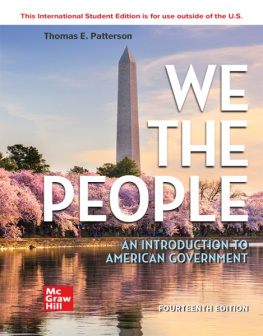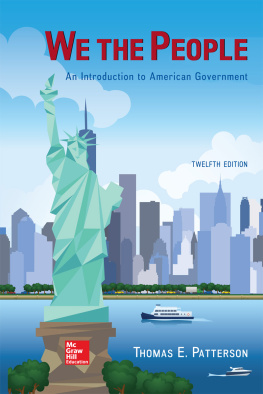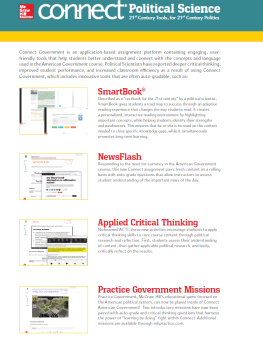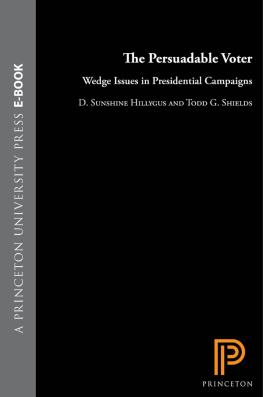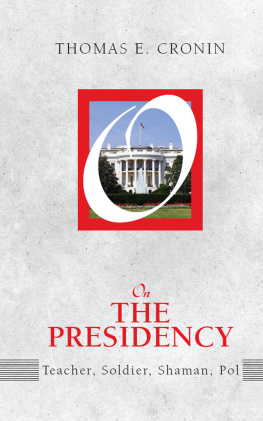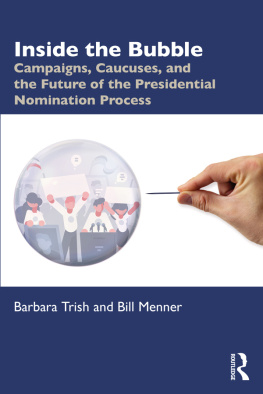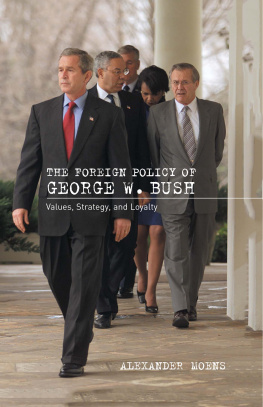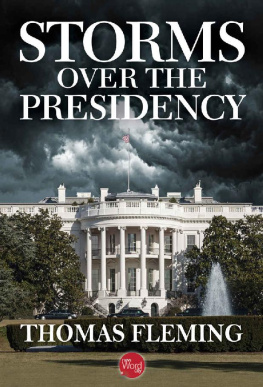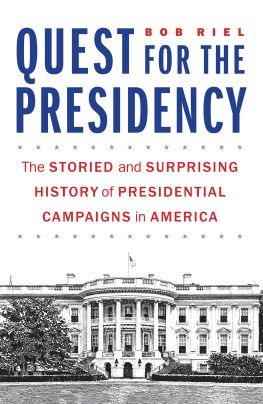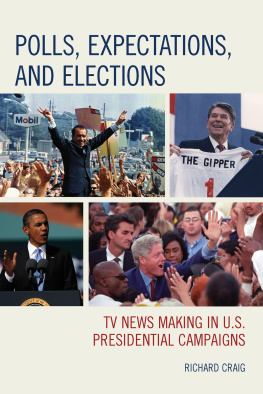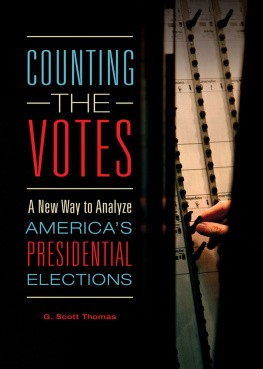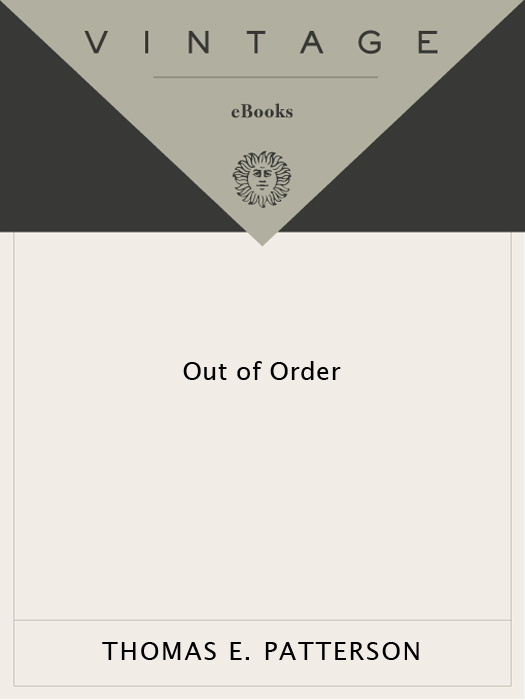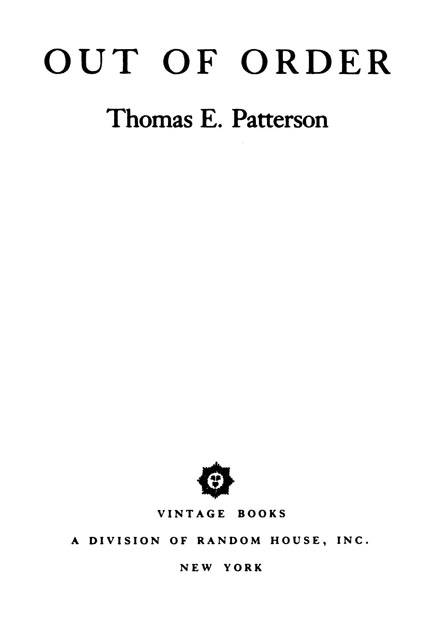Thomas E. Patterson
OUT OF ORDER
Thomas Patterson is professor of political science at the Maxwell School of Citizenship and Public Affairs, Syracuse University. He has written extensively on the medias role in elections. His previous books include The Unseeing Eye: The Myth of Television Power in National Elections; The Mass Media Election: How Americans Choose Their President; and The American Democracy. In 199192 he was Lombard Visiting Professor of Press and Politics at Harvard Universitys John F. Kennedy School of Government. He has received grants for his work from the National Science Foundation, the Markle Foundation, the Mellon Foundation, and the Ford Foundation.
ALSO BY THOMAS E. PATTERSON
The Unseeing Eye:
The Myth of Television Power in National Elections
The Mass Media Election:
How Americans Choose Their President
The American Democracy
FIRST VINTAGE BOOKS EDITION,
AUGUST 1994
Copyright 1993, 1994 by Thomas E. Patterson
All rights reserved under International and Pan-American Copyright Conventions. Published in the United States by Vintage Books, a division of Random House, Inc., New York, and simultaneously in Canada by Random House of Canada Limited, Toronto. Originally published in hardcover in slightly different form by Alfred A. Knopf, Inc., New York, in 1993.
The Library of Congress cataloged
the Knopf edition as follows:
Patterson, Thomas E.
Out of order / by Thomas Patterson.1st ed.
p. cm.
Includes bibliographical references.
1. PresidentsUnited StatesElection. 2. Mass mediaPolitical aspectsUnited States. I. Title.
JK524.P38 1993
324.973092dc20 93-9374
eISBN: 978-0-307-76149-1
v3.1
To Professor Michael J. Robinson,
whose ideas define our questions
CONTENTS
ACKNOWLEDGMENTS
Although I could not possibly have known it at the time, I started work on this book in 1972, when, with the help of a grant from the National Science Foundation, I co-directed a study on televisions impact on the presidential selection process. The resulting book, The Unseeing Eye, provoked debate in the press, among political types, and in the academic community. The book reportedly even made it to the Oval Office, but, judging by the outcome of the 1976 election, a knowledge of its contents did not help the Ford campaign very much.
This experience led to a book on the 1976 campaign, by which time I was hooked on the subject of the press and elections. Out of Order in some ways represents the concluding statement of this research agenda. It takes a sweeping look at presidential campaigns to show why a sound electoral system cannot be organized around the press.
Over the years, I have benefited from the assistance of more scholars, students, journalists, foundation officers, and political practitioners than I could possibly list here. I can hope only to mention those who contributed directly to this book. I will make an exception, however, in thanking Lloyd Morrisett of the Markle Foundation. The Foundation did not underwrite this book, but it was substantially influenced by work supported by an earlier Markle grant. Through its research grants, conference sponsorship, Commission on Campaign 88, and the underwriting of a portion of CNNs 1992 election coverage, the Markle Foundation has made a singular contribution to improving the quality of election news.
This book also owes a substantial debt to the Center for Media and Public Affairs in Washington, the Freedom Forum Media Studies Center at Columbia University, the Twentieth Century Fund in New York City, and the Joan Shorenstein Barone Center on the Press, Politics and Public Policy at Harvard University. Even a cursory review of the endnotes will reveal a book that could not have been written without the many conference reports and research studies sponsored by these organizations.
My thinking about the press and politics has been influenced by numerous scholars. They include Kathleen Hall Jamieson, Doris Graber, Shanto Iyengar, James David Barber, Russell Neuman, Wolfgang Donsbach, Jay Blumler, Maxwell McCombs, Steven Chaffee, Robert Entman, Larry Bartels, Robert Lichter, and Colin Seymour-Ure. Dog-eared copies of their books and articles on my bookshelves testify to my reliance on their ideas. The writings of the journalist Walter Lippmann have also been a constant source of wisdom.
I owe the greatest debt to Professor Michael Robinson, to whom this book is dedicated. Long before the rest of us, he recognized the key issues in the relationship between the press and presidential candidates. The grace and wit that characterize his writing make it a pleasure to turn time and again to his studies. Those who know Michael Robinsons work will recognize its impact on this book. His contribution to the field has been both substantial and unique.
The book was written in the supportive setting of the Maxwell School at Syracuse University. The Maxwell Schools dedication to public service is exemplary, and its congenial atmosphere makes me continually thankful to be on its faculty. My colleague Robert D. McClure got me started on the study of political communication. Professors Jeffrey Stonecash, Linda Fowler, Kristi Andersen, Stuart Thorson, and Arthur LeGacy also share and deepen my interests. John Palmer, Maxwells dean, encourages scholarship that extends beyond the academy to the real world of politics.
A number of Syracuse University students helped me to put the book together. Joe Montecalvo directed the content analysis; Jessica Sawyer provided regular guidance; Clark Gettinger spent endless hours in library archives; and Patrick Doyle held the project together. No person had a greater impact on the final wording of the manuscript than Lakshmi Srinivasan; her editing skills are unmatched among the many editorial assistants I have had over the years, save perhaps for Robin Toner, who now uses her writing talents toward a purpose higher than the redemption of my labored prose. Also contributing to the book were Brian Gottlieb, Jim Welte, Neal Carter, Robin Fritz, Nataya Nerngchamong, Jude McCartin, Nicole Arslanian, and Mark OGorman. Georgette Duncan, Krisan Evensoa, and Jacqueline Meyer provided administrative support. Jennifer Barber and Rachel Piorkowski, two Cornell University students, assisted on the project during a productive summer.


